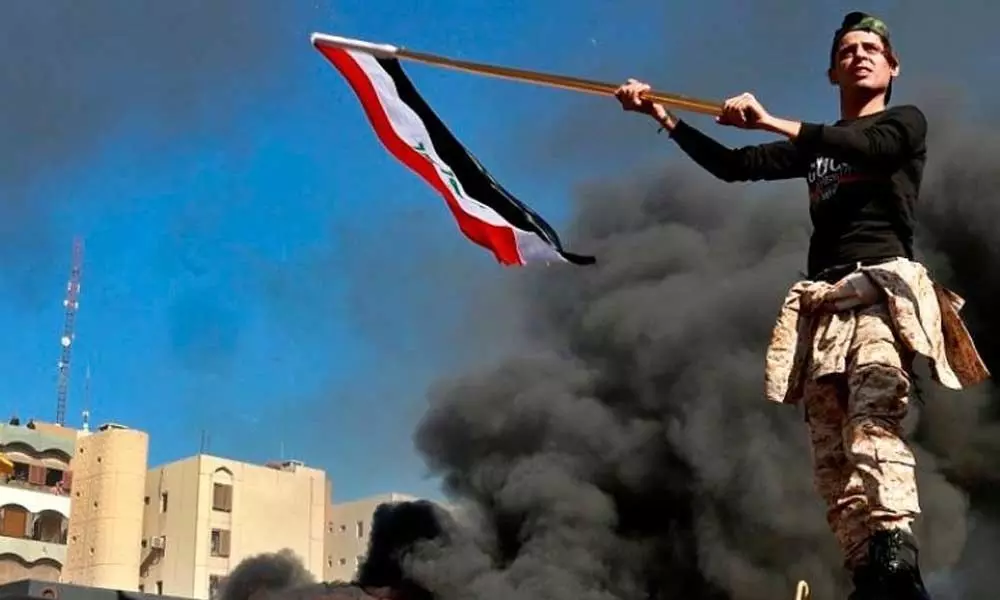A history of US-Iraq relations since 2003

Here are key dates in the relations between the US and Iraq after Washington carried out a deadly strike against Qasem Soleimani.
BAGHDAD: Here are key dates in the relations between the United States and Iraq after Washington carried out a deadly strike against top Iranian commander Qasem Soleimani on Iraqi soil.
Invasion
On March 20, 2003, a US-led invasion of Saddam Hussein's Iraq is launched after claims his regime is harbouring weapons of mass destruction. US forces take control of Baghdad the following month.
US President George W. Bush announces the end of major combat operations on May 1, but says the "war on terrorism" continues.
On October 2, a US report says no weapons of mass destruction have been found in Iraq.
Saddam is captured on December 13 near Tikrit, north of Baghdad. He is hanged three years later.
The broadcast in April 2004 of images of torture and other abuse of Iraqi prisoners at the Abu Ghraib US military prison shocks the world.
Power is transferred to an interim government in June.
Insurgency, sectarian conflict
In November 2004, more than 10,000 American and 2,000 Iraqi soldiers attack the flashpoint Sunni city of Fallujah which had become a symbol of resistance to the foreign presence after the lynching of four Americans in March.
In February 2006, Al-Qaeda-linked jihadists blow up a Shiite shrine in Samarra, sparking a wave of sectarian killings which leaves tens of thousands dead and lasts until 2008.
In January 2007, Bush boosts the number of troops to 165,000, saying the surge is needed to help Iraq's embattled government.
American soldiers depart
On December 18, 2011, US President Barack Obama, who had deeply opposed the war in Iraq, withdraws the last American soldiers, leaving the country mired in a severe political crisis.
Between 2003 and 2011 more than 100,000 civilians were killed, according to the Iraq Body Count database. The United States lost nearly 4,500 troops.
Fighting the jihadists
In January 2014 jihadists from the Islamic State of Iraq and the Levant (ISIL), later known as the Islamic State (IS) group, capture Fallujah and parts of Ramadi city.
In June they seize Mosul and by the end of 2014 hold one-third of Iraq.
The United States intervenes directly in Iraq, bombarding jihadist positions which threaten Iraqi Kurdistan and thousands of members of the Christian and Yazidi minorities.
With the help of the US-led coalition, Iraqi forces drive IS from all urban centres.
In December 2017 Iraq declares the "end of the war" against IS.
Iran steps up influence
Iran, which backs the Hashed al-Shaabi Iraqi paramilitary group that played a key role in fighting IS, becomes an influential ally and major trading partner of Baghdad.
Mass demonstrations erupt in Iraq on October 1, 2019, against unemployment, corruption and poor public services, but also against interference by foreign powers, notably Iran.
Since October, at least 12 attacks target Iraqi military bases where US soldiers or diplomats are deployed.
Some 5,200 US soldiers are currently deployed in Iraq as part of the anti-jihadist coalition.
US embassy siege
In late December, a rocket attack kills an American contractor.
In response, US airstrikes target bases belonging to the Hezbollah brigades -- one of the most radical factions of the Hashed -- near the Iraqi-Syrian border, killing at least 25 Iraqi fighters.
Iraq's caretaker government warns the strikes could affect ties with Washington
An outraged pro-Iran mob lays siege to the US embassy in Baghdad on New Year's Day, in an unprecedented attack on the American mission.
Elite Iraqi troops secure the embassy the following day.
Iran commander killed
On January 3, in the most significant escalation yet, US President Donald Trump orders strike on Baghdad's international airport, killing top Iranian commander Qasem Soleimani and the deputy head of the Hashed, Abu Mahdi al-Muhandis.
The Pentagon says Soleimani had been "actively developing plans to attack American diplomats and service members in Iraq and throughout the region".
Iran's supreme leader Ayatollah Ali Khamenei vows "severe revenge".














